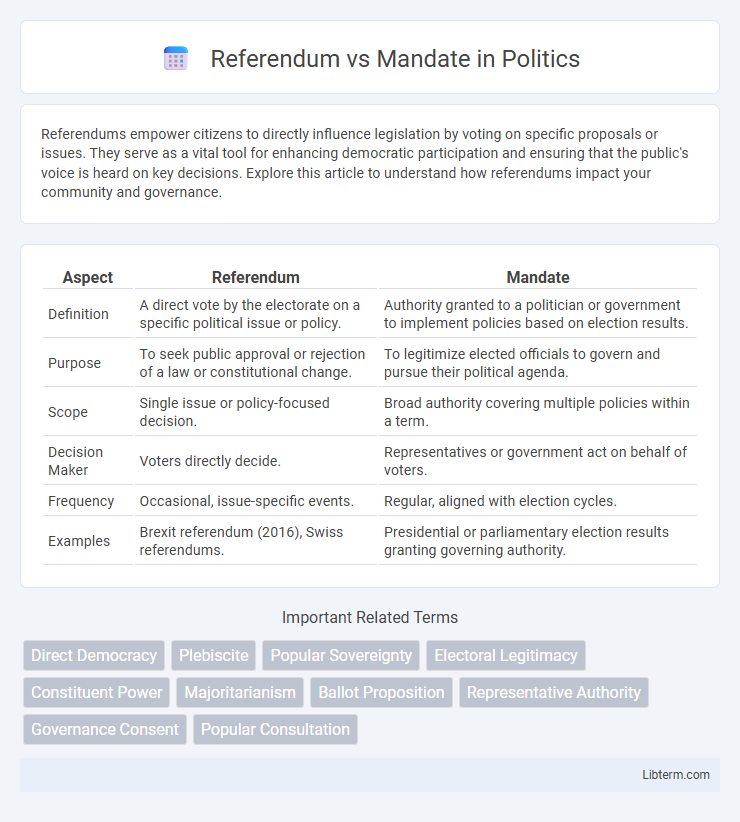Referendums empower citizens to directly influence legislation by voting on specific proposals or issues. They serve as a vital tool for enhancing democratic participation and ensuring that the public's voice is heard on key decisions. Explore this article to understand how referendums impact your community and governance.
Table of Comparison
| Aspect | Referendum | Mandate |
|---|---|---|
| Definition | A direct vote by the electorate on a specific political issue or policy. | Authority granted to a politician or government to implement policies based on election results. |
| Purpose | To seek public approval or rejection of a law or constitutional change. | To legitimize elected officials to govern and pursue their political agenda. |
| Scope | Single issue or policy-focused decision. | Broad authority covering multiple policies within a term. |
| Decision Maker | Voters directly decide. | Representatives or government act on behalf of voters. |
| Frequency | Occasional, issue-specific events. | Regular, aligned with election cycles. |
| Examples | Brexit referendum (2016), Swiss referendums. | Presidential or parliamentary election results granting governing authority. |
Introduction to Referendum and Mandate
A referendum is a direct vote in which the entire electorate is invited to accept or reject a particular proposal, often concerning constitutional changes or significant public policies. A mandate arises when an elected official or party gains a clear electoral victory, providing authority to implement their legislative agenda based on voter support. Both tools reflect democratic legitimacy, with referendums enabling direct public decision-making and mandates empowering representatives to act on behalf of their constituents.
Defining Referendum: Meaning and Purpose
A referendum is a direct voting process where citizens decide on a specific legislative issue or policy proposal, reflecting direct democracy in action. It serves the purpose of legitimizing laws or constitutional amendments by obtaining public consent, ensuring that major decisions align with the electorate's will. The mechanism empowers voters to approve or reject government initiatives, bridging the gap between representative governance and popular sovereignty.
Understanding Mandate: Concept and Application
A mandate represents the authority granted by voters to elected officials to implement specific policies or agendas, reflecting public approval and trust in their leadership. It differs from a referendum, which is a direct vote by the electorate on a particular issue or law, rather than on a candidate or party. Understanding a mandate involves recognizing its role in legitimizing government actions and shaping policy direction based on electoral outcomes.
Key Differences Between Referendum and Mandate
A referendum is a direct vote by the electorate on a specific issue or policy, allowing citizens to accept or reject proposed legislation, while a mandate refers to the authority granted to an elected official or government to implement a particular agenda based on electoral victory. Key differences lie in their nature: referendums provide direct public participation on policy decisions, whereas mandates represent indirect public approval for governance through elected representatives. Referendums are issue-specific and temporary, whereas mandates confer broader political legitimacy and are linked to the term length of the elected government.
Historical Examples of Referendum and Mandate
The 1995 Quebec Referendum on sovereignty is a prime historical example of a referendum, where citizens voted directly on the province's independence from Canada, resulting in a narrow defeat with 50.58% voting "No". Contrastingly, the 2016 UK General Election served as a political mandate for Prime Minister Theresa May to initiate Brexit, reflecting parliamentary support to withdraw from the European Union. Referenda provide direct public decision-making on specific issues, whereas mandates reflect broad electoral endorsement for government policies or leadership.
Legal Framework: Referendum vs Mandate
The legal framework governing referendums typically involves direct public voting on specific legislative or policy issues, requiring clear procedural rules and thresholds for validity. Mandates are formal authorizations granted, often through elections, empowering representatives or officials to enact policies within constitutional or statutory limits. Distinctions arise as referendums emphasize direct democracy under electoral laws, whereas mandates function within representative democracy guided by statutory mandates and governance structures.
Political Implications of Referendum and Mandate
Political implications of referendums include direct voter engagement in decision-making, which can enhance democratic legitimacy but also risk populism and oversimplification of complex issues. Mandates, by contrast, confer authority to elected representatives to implement policies based on electoral victory, providing stability and clear accountability. The choice between referendum and mandate impacts governance by balancing direct public input with representative decision-making effectiveness.
Advantages and Disadvantages: Referendum vs Mandate
Referendums allow direct public participation in decision-making, enhancing democratic legitimacy but may oversimplify complex issues and lead to populist outcomes. Mandates provide elected officials with authority to implement policies, ensuring clear leadership and accountability, yet risk disconnecting from the direct will of the people and potentially reducing public engagement. The choice between referendum and mandate impacts political stability, policy responsiveness, and citizen empowerment.
Impact on Democratic Processes
Referendums empower citizens to directly influence specific policy decisions, enhancing participatory democracy and increasing political engagement. Mandates, typically resulting from electoral victories, provide elected officials with a perceived broad endorsement to implement their agendas, streamlining decision-making processes within representative democracy. Both mechanisms shape democratic legitimacy, but referendums promote direct accountability while mandates reinforce representative authority.
Conclusion: Choosing Between Referendum and Mandate
Choosing between a referendum and a mandate depends on the need for direct public involvement versus representative decision-making authority. Referendums provide clear, democratic legitimacy by allowing voters to accept or reject specific proposals, enhancing transparency and accountability. Mandates empower elected officials to implement policies based on electoral support, offering flexibility and swift action in governance.
Referendum Infographic

 libterm.com
libterm.com